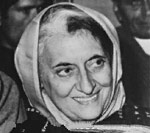

 |  |
 Almost immediately after the 1971 general elections, a major political-military crisis broke out in East Pakistan (now Bangladesh). India was inevitably drawn into the fray, leading to a bloody war between India and Pakistan. Almost immediately after the 1971 general elections, a major political-military crisis broke out in East Pakistan (now Bangladesh). India was inevitably drawn into the fray, leading to a bloody war between India and Pakistan.Pakistan had been created around the ideological assumption that because of their faith, the Muslims of India constituted a separate nation. However, religion was not enough to weld together the Punjabi-speaking part of West Pakistan with the Bengali-speaking East Pakistan. The West Pakistani political and economic elite soon acquired a dominant position in Pakistanís army, bureaucracy, economy and polity resulting in economic and political discrimination against East Pakistan. Moreover, in the absence of political democracy, the Bengalis had no mechanism through which to remedy the situation. Consequently, over time, the people of East Pakistan developed a powerful movement for democracy in Pakistan and greater autonomy for East Pakistan. Instead of coming to terms with this movement, the ruling elite of Pakistan decided to suppress it and which ultimately transformed it into a movement for independence from Pakistan. In December 1970, General Yahya Khan, the military dictator of Pakistan, held free elections in which Bengalís Awami Party under the popular leadership of Sheikh Mujibur Rahman won more than 99 per cent of the seats in East Bengal and an overall majority in Pakistan's National Assembly. But the army and Yahya Khan, backed by Zulfiqar Ali Bhutto, the leading politician of West Pakistan, refused to let the Awami Party form the government. When the latter started a civil disobedience movement to enforce the constitutional provision, in a sudden move on 25 March 1971, Yahya Khan ordered a military crackdown on East Pakistan. Mujibur Rahman was arrested and taken to an unknown destination in West Pakistan. The West Pakistan army initiated a reign of terror, killing innocent citizens, burning villages and crops. Thousands of intellectuals and Bengali members of the police and army were indiscriminately but systematically eliminated in order to deprive the people of any leadership. For over six months, the army committed rape, torture, arson, brutal killings, and other heinous crimes. Large sections of the East Pakistan police, paramilitary organizations, and East Bengal regiments reacted by revolting. The Awami League leaders, who succeeded in escaping to Calcutta, formed Government of Bangladesh in exile and organized the Mukti Bahini (Liberation army) and launched a fierce underground movement and guerrilla warfare. The brutality of the Pakistan army was specially directed against the Hindus remaining in East Pakistan who were faced with virtual genocide. They were forced to migrate to and seek shelter in West Bengal, Assam and Meghalaya in India. By November 1971, the number of refugees from East Bengal had reached ten million. In India there was a wave of sympathy for the people of East Bengal and a strong demand for swift action against Pakistan. However, the government, though convinced that war with Pakistan was likely, opposed hasty action. She did not want to strengthen Pakistani propaganda that the entire movement for autonomy in East Pakistan and the consequent revolt was not a popular uprising but an Indian conspiracy. |
Copyright ©2000 indiansaga.info. All rights reserved.
By using this service, you accept that you won't copy or use the data given in this website for any commercial purpose.
The material on indiansaga.info is for informational & educational purpose only.
This site is best viewed at 800 X 600 picture resolution.